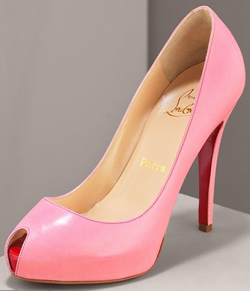Toeing the Line
Pippa’s feet hurt. They’re wedged in narrow pumps and she’s been on them all day. She’s moving between the till and a number of milling customers, which include a formidable lady in her forties sporting a mass of auburn curls and examining a pair of shiny black boots. “D’you have them in a thirty-nine?” she calls over, waving the article at her. “I’ll just check for you now”, Pippa says, issuing a receipt and handing the customer at the till her bag before returning to the lady.
While she’s in the stockroom, Pippa’s colleague appears, her head barely visible beneath the enormous tower of shoeboxes she’s carrying. “Deliveries just in”, she whispers as Pippa emerges with the boots in a thirty-nine. “Oh, God”, Pippa gasps looking at the mountain of boxes growing in front of her.
Meanwhile, the lady has begun tapping her foot. Pippa hastens over. “Hi there. I’m really sorry for the delay. Unfortunately, we only seem to have size 39 in navy..” The lady purses her lips. “Is that right?”
“Yes, unfortunately. But I can check with our other branch to see if they have them in stock”.
She blinks a few times. “Alright, check”.
Pippa goes to the phone behind the till but there’s already another customer waiting to buy a pair of shocking-pink heels. “Sorry for keeping you”, she says taking the box and commenting, “they’re gorgeous” as she drops them into a plush black carrier bag.  Transaction complete, she calls the other branch and dodges around the heap of boxes her colleague is sorting. On the way, another customer taps her on the shoulder.
Transaction complete, she calls the other branch and dodges around the heap of boxes her colleague is sorting. On the way, another customer taps her on the shoulder.
“Are these leather?”
“They wouldn’t be entirely leather”, Pippa replies apologetically. “but they’re leather-lined”.
Back with the lady now, Pippa explains that she branch ten minutes away has the black boot in size 39 in stock.
The lady shakes her head vigorously; “Oh, I just can’t face the walk!”
“Or I could order them in for you?”, Pippa suggests.
The lady takes another look at the boot, with its glittery heel and floppy leg and puts it down. “I’ll leave it”.
“No problem”, says Pippa brightly, packing it back into its tissue wrapping and returning it to the stockroom upstairs. Her colleague is now up at the till dealing with a man who is demanding a refund for a shoe his daughter damaged while out dancing. As soon as he’s gone, Pippa’s colleague calls over to her and says “hey, go on your lunch, you haven’t even had a break”.
Pippa takes a look at the heap of boxes, at the group of shrieking friends who’ve just come in looking for matching stilettos to wear to a hen night and at the accounts that are yet to be filled in. The sales target figure her boss has given her seems alarmingly out of reach. Rocking Around the Christmas Tree comes on again. “I can’t”, she says.
Living on a shoestring
Pippa has been working in the shoe shop for the last year and a half. She’s got a Master’s Degree and worked part-time all through college. She’s one of the 216,229 retail workers in Ireland and part of a growing number of graduates entering the sector.
Like many others retail employees, Pippa’s work conditions are poor. She splits her time between the various branches of the shop and frequently runs the smaller outlets with no help. “It’s a nine-hour shift, on my own, with no break”, she says.
Quite apart from compromising safety, such conditions represent a breach of the law, which states “Shop employees who work more than 6 hours and whose hours of work include 11.30am-2.30pm are entitled to a one hour consecutive break which must occur during those hours”. Furthermore and rather curiously, retail workers in the Footwear and Drapery trade in Dublin only “are entitled to a 15-minute paid break (exclusive of the main meal break) if working more than 4 ½ hours.” Taking into account the amount of work she does and her experience, Pippa feels that she “could do with getting more than nine euro an hour at this stage”.
To add insult to injury, Pippa is not allowed to wear her own shoes but is instead forced to wear footwear that the shop stocks, for which she must pay out of her own wages. She finds them uncomfortable and permanently suffers from blisters. “I have wide feet”, she explains and “because of that these type of shoes hurt”. The one time she dared to come in to work in her own shoes, she was shouted at by her manager. “She just went crazy”, Pippa remembers.
Fear of managers and bosses is widespread among the workers I speak to. “It’s just a lack of respect”, one girl tells me. “We’re dispensable, so they can afford to treat us badly”. Pippa is used to being shouted at. Of her manager she says, “She has been horrible to me on many occasions, but, to be honest, it’s just her manner with you, and a build up of little things, which over time, would have your confidence in ribbons!” she says, adding, “everybody is scared of her”. On the week I pop by, she has been made cry twice by her employer, which Pippa describes as a “new record”.

Image source journal.ie
“We’re just the Christmas slaves”
Wendy, also a graduate worked her sixth Christmas in retail this year. “In the three weeks before Christmas I worked 16 late shifts; they included 2pm-11pm and 2.30pm-12.00am. There were a few consecutive days where I did not even see daylight. I would come home from work at 12.30am, finally wind down to sleep at 3.00am, wake up at 1.00pm to get to work by 2.30pm … I lived like a vampire, microwave meals became my everyday dinner; eating a home cooked meal was a rarity … My sleeping pattern has become alarming and now that the Christmas rush is over all of us on our staff are suffering with colds, infections and the flu from being so run down and stressed. All because people want to shop at 11pm at night … I remember on one occasion finishing at 12.15am, heading home to bed and my alarm going off at 5.30am to be in the store by 7am: all for minimum wage.”
“Nobody thinks about us”, she says “we’re just the Christmas slaves to the shoppers”.
Compared to other years though this Christmas has not been the worst for Wendy: “The years I worked in fashion retail at Christmas were hell but selling face creams and body lotions is pretty straightforward”.
Short-staffing and Dispensability
The problem of short staffing is widespread in the retail sector. With employers taking on fewer staff, individual workers are forced to work longer hours and to go beyond their prescribed duty. The scramble for vacancies makes employees less likely to speak out against their employers’ malpractices, for fear of losing their job to the ever-growing queue of people hoping to take it. The participation of shops in the Government Job Bridge Scheme, which pays interns €50 on top of their weekly social welfare allowance to work for a period of up to nine months, further restricts the number of workers hoping to get paid minimum wage for doing the job.
Experiences with customers: a mixed bag
Mandate, the third largest trade union in Ireland represents 40,000 workers, the majority of which are employed in major retail companies. In 2009 it launched its Respect Retail Workers Campaign following a survey it carried out on twenty retail businesses and their employees, which found that 74% of workers had received verbal threats from customers in the past year and almost 10% had been assaulted by a customer in the course of their employment.
For Pippa, encounters with customers have been varied “Experiences with customers can be really lovely and make you feel very appreciated and like you have helped someone in some little way, even if it is just by lending them an ear; other times, it can be hell!”
Wendy agrees, “Honestly customers were not so bad this year … but of course there were the people who argued over 20 cent for a gift wrap bag that went to charity and the man who wanted money off for buying three things”.
Employees of smaller business losing out
For the thousands of retail workers employed by smaller businesses who are not part of a union, bringing change about is a difficult, risky process. Speaking out threatens to damage relations with colleagues as well as prospects of promotion. The “At least I have a job” mantra appears to be the guiding principle behind silent, gritted teeth and stoic continuance.
As for work being valued, according to Pippa, “Nothing I’ve seen or heard would really suggest it. It’s a tiring job at first, but you do get used to it. Emotionally it can be awful at times, but the people around me are lovely. It’s nice to be working around people my age, who can pick you up when you are down”.
As for the employers, who are supplied with an ever-increasing number of staff faced with little choice but to work in poor conditions, a change in behaviour is bound to come from above rather than below. For the Government, that means enforcing and checking on the written records employers are required to keep of hours worked, to impose the maximum fine of €1,900 on employers who fail to co-operate with it and to monitor the Job Bridge Scheme to make sure that it introduces more, not fewer paid workers into the sector.
What do you think? Have you ever worked in retail? Do shop workers have it tougher than most?













